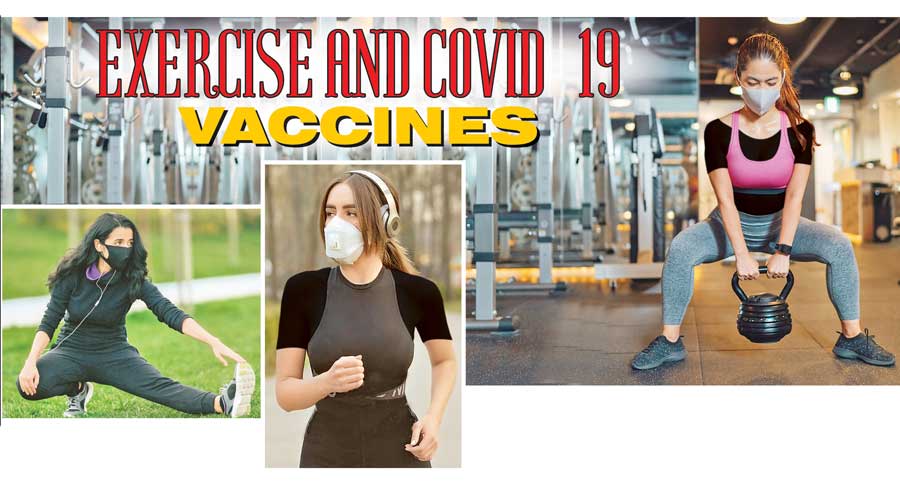Fit for Two: Exercise Guidelines During Pregnancy
- 13 Apr - 19 Apr, 2024

We’ve finally reached the point where everyone is slowly but surely becoming eligible for a Covid-19 vaccine. Although it’s clear the vaccines offer great protection against Covid-19, you still may have some questions about how they’ll affect your everyday life. Take working out, for instance: Maybe you’re wondering about exercise and the Covid-19 vaccines – and whether your exercise habits can influence your reaction to the shot. Can working out impact this all-important vaccination? And then, what about what comes after? Here’s what you need to know about exercising and your Covid-19 vaccination.
Moderate exercise shouldn’t harm your vaccine response – and experts are even looking into whether it may help it
While there are no actual quick “immune boosters,” moderate exercise does help your immune system function properly. So, it’s only logical that scientists have wondered how an exercise session affects vaccine response in general. Because the Covid-19 vaccines are so new, however, there’s not much data on how exercise may affect the immune response to those vaccines specifically – and even existing data on other vaccines is not exactly conclusive. Still, there’s also no data showing that moderate exercise hurts your immune response.
The more pertinent question, then, is whether moderate exercise can help your immune response. There has been prior research on earlier vaccines that suggest a potential benefit to exercise. A 2014 review published in Brain, Behaviour, and Immunity analysed 20 studies and concluded that both chronic and acute exercise may boost vaccine effectiveness.
Besides, while some research suggests a potential benefit, it’s also important to recognise that not exercising regularly didn’t show any harm to the immune response.
So, there’s no need to push yourself into exercise you don’t want to do in the hopes that you’re improving your immune system response for the shot. In fact, in a nod to your upcoming vaccine, it might actually be helpful to ease up a little before getting vaccinated.
You may want to go easier in your workouts prior to your vaccine
Because it’s hard to predict whether or how intensely you’ll experience side effects, you may want to dial back the intensity of your workouts during the 48-hour period before you get your shot.
So, if you typically go for a brisk 30-minute walk, don’t try a new bootcamp class; if you’re training for a half-marathon, trade hill repeats for an easy run. That’s because trying new workouts, or exercising more intensely than usual, can lead to delayed-onset muscle soreness. This soreness can make you feel worse if it’s compounded by flu-like side effects from the Covid-19 vaccine.
Gentle movement after your shot may help ward off soreness
The CDC recommends you “use or exercise your arm” to minimise post-vaccine soreness. Unfortunately, there’s no real research out there on specific frequency, duration, or type of exercise to help you feel better.
This movement can involve upper-body strength training, as long as it isn’t making your pain any worse. A light workout for your arms and shoulders can help get your blood circulating, which may help arm soreness.
If you’re way too uncomfortable to even think about picking up a dumbbell or trying a push-up, intermittent, gentle arm movements can help with pain and swelling by stimulating blood flow. Shoulder circles, flexing and extending your elbow, or even gently rubbing your arm is suggested. Also, try to keep using your arm as you normally would, which can promote circulation. While this likely won’t prevent soreness, it might make it a little more manageable – which can be good news for your future workouts.
Adjust your workout expectations for the week following your vaccine
For the week following your vaccination, dial back the intensity of your workouts by about 20 per cent and reduce the volume according to how you’re feeling. If you’re preparing for a race or an event, the week after your vaccine is a great time to build in a deload week (i.e., an easier week where you reduce your volume or intensity in order to recover and come back stronger).
If you feel fine, there’s no reason to avoid your regular routine, including longer or more intense workouts.
You still need to take precautions at the gym after getting your vaccine
You’re fully vaccinated two weeks after your second shot. That doesn’t mean you should go back to business as usual – meaning, no mask – at your gym or yoga studio even if the location does not require a face covering. So, when you’re exercising in public, the CDC guidelines we’ve been following since last year still apply.
COMMENTS